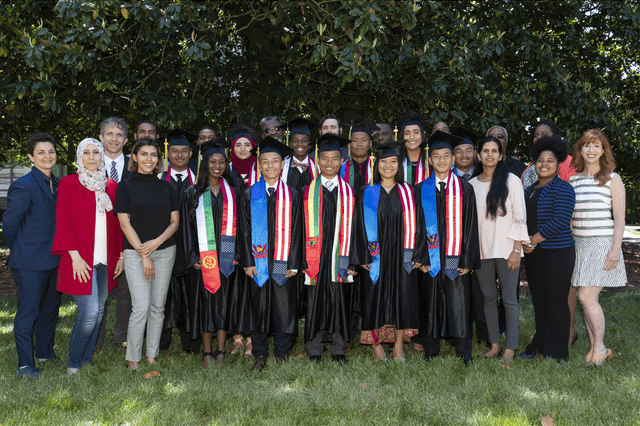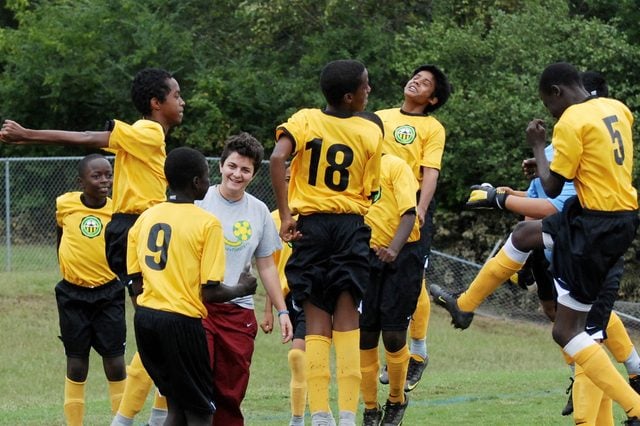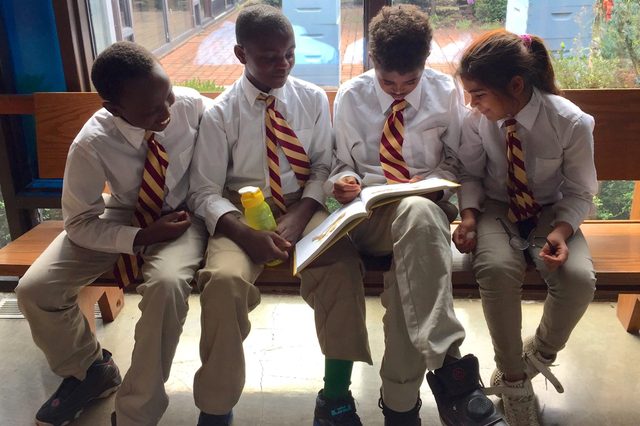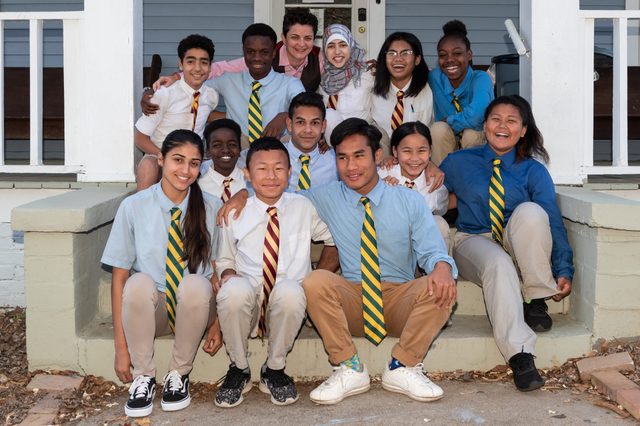The Nicest Place in Georgia: The Fugees Family in Clarkston
NICEST PLACES IN AMERICA 2019 FINALIST
"Helping Refugee Children Find Their Place and Succeed in America"
This non-traditional school uses soccer to help refugees learn, and it has a 100% college acceptance rate.
In 2019, 100 percent of the graduating class of the Fugees Academy in Clarkston, Georgia, was accepted into college, and every single one of them was the first in their family to make it past middle school.
It’s a point of pride for the few schools that manage it. For Fugees, it’s extra impressive given the struggles faced by some of its students.
Established in 2004, the school is uniquely designed to help refugee children thrive. Founder Luma Mufleh, who fled her native Jordan and was given political asylum in the United States in 1999, got the idea when she stumbled upon some boys playing street soccer. She joined their game, and soon the boys—refugees from Liberia, Sudan, and Afghanistan—opened up with their stories. They had fled the horrors of war and famine and were struggling in America, where they weren’t getting the attention they needed to succeed in school.
Mufleh asked herself what she would do if these were her kids. “What’s really awesome about this country is that you can build solutions to problems,” she says.
So she sought out the students with the greatest academic need and used soccer as a way in. At Fugees, all 90 kids play soccer every day; they read about soccer; they write papers comparing and contrasting the styles of Messi and Ronaldo. Each pupil reads his or her report card to the entire school, and if a grade is slipping, the student body must decide how they, together, will get that grade back up.
“We want them to see that there’s no shame in struggling,” Mufleh says. “We’re going to help you no matter what.”
One Iraqi pupil, who survived kidnapping, bombing, and other hardships, recently wrote a brief biographical essay. “I attend a small private school called the Fugees Academy,” she wrote. “I’m sad when we get days off during snowstorms and holiday breaks.”
Fugees recently opened a second school, in Ohio, with a third one soon to follow.
—The Editors
The Nomination
Coach Luma Mufleh founded Fugees Family, a nonprofit that uses soccer, education, and community to empower refugee children to excel in school and integrate into the US. Founded as a soccer team, it’s now the first U.S. school network for refugee kids.

Many refugees have been through something many Americans can barely fathom—surviving a war zone, seeing a family member murdered, losing their home, and starving. If they make it to safety in the U.S., they’re scared, don’t speak the language, feel isolated, and still struggle to make ends meet. And, then these kids still have to go to school—no wonder they aren’t getting good grades!

Enter Luma Mufleh. Luma Mufleh sought asylum in the U.S. because she’s both Muslim and gay, so she couldn’t go home to Jordan. She had to give up everything. But she’s grateful because America gave her freedom, and with the help of her community she’s giving back. A former soccer player, Luma started a free, organized team for refugee boys about 15 years ago. Through that team, Luma realized all the challenges refugee kids face, including education. So, she started a school with support from her community, many faith groups, and donors. Luma’s Fugees Family is a growing network of schools that helps refugee children excel in school while dealing with their traumatic experiences and mastering the English language. With 100% high school graduation and college attendance rates at her flagship school in Clarkston, Luma’s story is a testament to what is possible when a community believes in refugees and comes together to support them.

Fugees Student From Sudan: In the summer of 2003, my dad went to the market in Darfur, and I was with my mom and her friend as they drank cups of tea. From the distance, we could hear vehicles approaching, and planes flying overhead. Out of nowhere, we heard screams, “The Janjaweed are coming, run, they are coming.” The Janjaweed are a militia that operates in Western Sudan and Eastern Chad. The sound of gunshots and bombs caused everyone to scatter in fear, desperately looking for their loved ones. In horror, my dad rushed home as the rebels killed with no hesitation. We fled. I was five. We had no home, no food, no joy. We journeyed through five countries in Africa by foot: Chad, Nigeria, Benin, Togo, and Ghana. Four years in Ghana. In the middle of the village was one board. My mom called it the board of hope. Every month, only 50 people out of 9,000 were chosen to come to America. Every month, I would wake up early to run to the board to be the first one there to check. After days, months, and years, the day came. Now, after seven years in the United States, I’m a senior in high school, living in Stone Mountain, Georgia. I attend Fugees Academy, a diverse private school of refugees from all around the world. At Fugees, I have won a state championship in cross country two times and posted the fastest time in the state (16:35). I have excelled in soccer (a game from my home) and have played varsity since eighth grade. In my spare time, I help my dad run his car business and pay the bills, and my mom with English and taking care of other six young siblings. I also work part-time making funnel cakes at Stone Mountain Park. My journey has not been easy. But it has made me stronger. My hope is to one day take care of my parents and provide back to my village.

Fugees Student From Iraq: I, a two-year-old, am kidnapped and held as a hostage in our kitchen in Baghdad, Iraq. The gas from the stove is left on, resulting in me developing asthma. One year later, on a cloudy morning in 2003, I sit next to a window playing Barbie dolls with my sister. A loud noise, nothing like I’ve ever heard before, rings my eardrums. The house shakes. Black thick smoke. I am now four-years-old. After surviving a year in the Iraqi-American war and receiving many death threats, my family hides in a coach bus that drives across the desert to escape to Syria. In Syria, I attend a special hospital to get treated. Many doctors notified my parents that I won’t live to the age of nine. My family lives in a one bedroom apartment in an abandoned building. My three siblings and I sleep in the living room. The living room’s windows are broken, which exposes our skin to the cold breeze of mid-winter. We sleep on tiled floor and use each other as blankets. My dad works full time at a bakery. The bakery allows him to take home any burned bread. That’s our dinner. In 2009, my family gets the news that we are chosen to come to the United States. My parents don’t believe it. On August 8, 2009, we arrive to our new home: Atlanta. I’m taken to a hospital several times that first year for having several asthma attacks. Thankfully, the medicine here works. Over time, I had less and less asthma attacks. I’m finally able to focus on school, which is something that makes me really happy. I’m able to attend school a lot more often and not miss days for being sick. I’m able to learn. I live in a house with electricity, food, and water. I attend a small private school called the Fugees Academy, where I’m sad when we get days off during snowstorms and holiday breaks. My name is Harwaa from Iraq and I lived past the age of nine.
What do you think of The Nicest Place in Georgia: The Fugees Family in Clarkston?